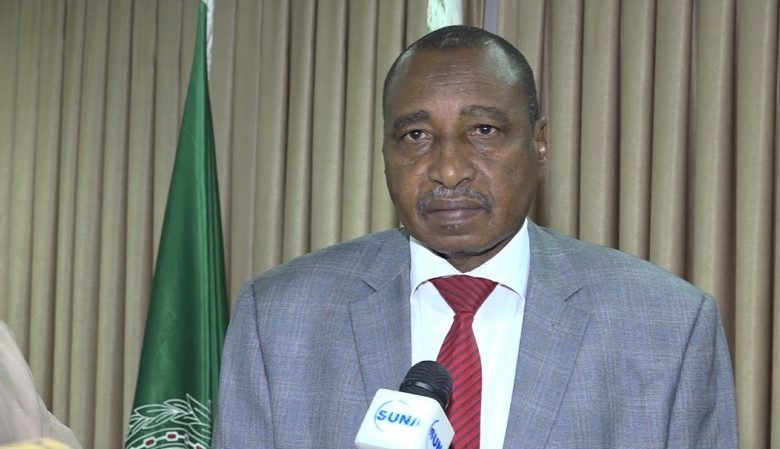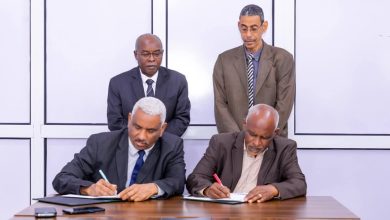Secretary-General of the AOAD Unveils Arab Food Security Issues Al-Dukhairi: The war affected the agricultural sector , this is our plan for reconstruction

We have an initiative to support agricultural seasons in Sudan ( 1-2)
Sudan Events-Interview: Nahid Oshi
Secretary-General of the Arab Organization for Agricultural Development AOAD , the former Minister of Agriculture, Prof. Ibrahim Adam Al-Dukhairi, revealed the organization’s efforts, in coordination with the Arab League States, to contribute to the reconstruction of the agricultural sector in Sudan after the end of the war, noting that Sudan enjoys a detailed budget that facilitates it to achieve Arab food security and bridge the food gap. He touched, during an interview to Sudan Events on the affect of neighboring countries by the outbreak of war in Sudan and the cessation of intra-trade movement, which was supporting in one way or another the supply of these countries with crops produced in Sudan.
Many agricultural sector issues were revealed in the following Interview.
The agricultural sector began to be affected by the war in Sudan.
To what extent could it affect Arab food security, particularly since Sudan is considered the world’s food basket?
_The sectors most affected by the war that nearly lasted a year
As there was a portion of the winter crops that had not been harvested, difficulties were encountered in harvesting the season and then difficulties in marketing the products.
This was a major difficulty faced by the farmers.
The Sudanese agricultural sector is of utmost importance in the issue of regional (Afro-Arab) food security due to the presence of border overlaps and intra-regional trade. With (Egypt, Central Africa, Chad, South Sudan, Ethiopia, Eritrea, part of Kenya).
When the war broke out and the flow was cut off, the neighboring countries suffered from the cessation of the movement of intra-trade, which was supporting in one way or another the supply of these countries with the crops produced in Sudan in all its seasons.
And livestock. In addition to the fodder that was exported to neighboring countries, it was affected by the cessation of transportation and security difficulties.
The time of the outbreak of war coincided with preparations for the summer season, and this year a fatality occurred, as the state apparatus was paralyzed and problems occurred in the banks due to the attack on the infrastructure of Rebellion.
All of these factors affected the supply of crops to neighboring countries, and this in turn directly affected food security. A large part of Sudan’s food security comes from local production, with the exception of some crops such as wheat, and the preoccupation with war and security liquidity led to a decline in agricultural areas. Thanks to Allah for help.
The rainy season was very good and productivity was high, particularly in the states of Gedaref and Sennar and some areas in Gezira .
The scarcity of areas is accompanied by some moderation in rainfall levels, and reports from the Ministry of Agriculture indicate the success of the agricultural season despite the scarcity of areas.
An increase of people who are facing food shortages, different reports, and he said that the reports of the Ministry of Agriculture indicated that the food security situation has been affected, but not as stated in the reports of some UN bodies.
The impact of the war was severe on the various economic sectors, and the agricultural sector was affected. There are various efforts made by the state agencies that led to stability.
The national agricultural projects in central and northern Sudan were far from the war, but there was great atrophy in the agricultural sector.
After the war in Sudan stops, what is the expected role of the organization in supporting the agricultural sector in Sudan?
_ After the outbreak of war, and in coordination with the Arab League States, there is a tendency to find a formula for rapid intervention in the matter of the agricultural sector in Sudan through the initiative of the Secretary-General of the Arab League and Organization for Agricultural Development (AOAD)
(Initiative to support agricultural seasons in Sudan) by supporting farmers and the Sudanese government so that it plays its role in achieving the goals of the agricultural sector, and this is a role required of countries, then framing and expanding contract crops, especially since Sudan has trade relations with neighboring countries so that the paths are not cut off and until we are legalized. Therefore, we sought within the framework of the sector. Special emphasis on the role of contract farming through holding three ongoing conferences.
Some of the existing efforts have been supported, in addition to the presence of communication and economic mobility in some stable areas such as the Nile River State.
The following are livestock exports after the rehabilitation of the slaughterhouse in the state by the Saudi private sector, and the River Nile State has become one of The continuous states across the sea, in addition to many of the different states of Sudan, products reach the Egyptian market through the northern ports, and the expected role of the private sector in increasing trade exchange.
A conference was held in Lebanon to present a vision of how to establish an increase in trade exchange and contract farming, and another conference in the Turkish capital, Istanbul, and there is a plan with the sector.
The Sudanese and Egyptian specials will soon coincide with stability and calm conditions in Sudan and the arrival of the people of Sudan to the hoped-for national project to end the war.
We have an extensive discussion about the reconstruction of the agricultural sector after the end of the war, and it will be under the greatest leadership in Sudan, bringing together the various ministries to carry out concrete, clear and deliberate work to bring about a major transformation in the agricultural sector at the irrigated, rain-fed and semi-automated levels so that the slogan of Sudan, food basket of the world, will be achieved.
This effort supports the efforts of the country’s leadership. In thinking about post-war reconstruction, the vision is there. It needs regional and international alignment to bring about the desired movement, and the most important requirement is achieving the Greater Arab Free Trade Area.



